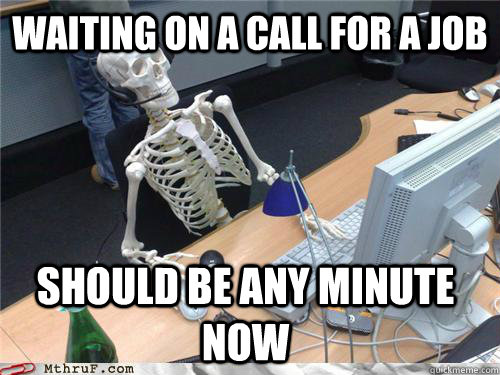If you’ve ever applied for a job, internship, promotion or anything else you saw as a step-up in your career, you were probably rejected at least once. If you didn’t then – thanks for reading, Queen Elizabeth II.
Better yet, you were rejected by ghosting (the original term refers to dating situations but it can serve for this context just as well) and you never got it in written. You just assumed so after you didn’t get a reply after 6 years (hint: you shouldn’t be waiting for that long).

Before you get all bitter and wish to have a huge e-mail rant, think of how rejections can also be great growth experiences.
1. You will improve (if you want)
Whenever rejected for a job you should get constructive feedback that will help you prepare better next time and be on top of the game.
In case you don’t receive any feedback- do ask for it. You spent your time and effort going through the process and you have a right to know the reason for rejection.
Good feedback is a true blessing and a good recruitment process doesn’t necessarily end with an offer but it should end with you feeling you had a good growth experience and a constructive takeaway.
Best of all, you’ll be able to perfect how you speak about yourself because sometimes glowing recommendations and great experience aren’t enough if you have a charisma of a damp rag.
2. Learn to take feedback
It is shocking but not everybody knows that feedback is meant to be accepted and thanked for. You don’t defend yourself or give excuses when someone tells you you’re too junior for the position or you don’t have the right skillset. You don’t get angry, offended or start giving excuses. Just don’t.
Contrary to what you might think, this kind of approach will just put off the other person and show them you’re not mature enough to accept feedback and that they were right to not give you a job in the first place.
3. You’ll know what you really want
I know this sounds silly because why would you apply for something if you don’t want it- you might ask.
Sometimes you’ll get that feeling of relief when you don’t get something because halfway through you’ll realize that this experience isn’t right for you. Something might be off or just simply you’ll understand there’s something better you can pursue.
Talking to different people and different companies can make it easier to know and decide what kind of career path you want to be on.
4. Persistence
In almost any context, persistence is a true virtue. Rejections teach us to keep trying and improve each time until we know what exactly we want and how to be the best we can.
Most likely some of the jobs you applied were nothing close to what you want or deserve. Each job process teaches us something new about ourselves and how to improve.
Maybe 6 months ago you wouldn’t have been ready to apply for your dream job but after a couple of rejections and experiences, you’re armed with good feedback, you know what and how to improve and you’re ready like never before.
5. Network for the future
Unfortunately, not every recruitment process is a pleasant experience and not every hiring manager will treat you in a special way. But, there will be the ones who will.
Even if you don’t get that job you truly wanted, it’s worth to politely thank the person and make sure they remember you regardless of the end result.
They might be hiring again or they might be in a hiring role at their future workplace or none of those but they just might be someone you can learn from. In any case, every interaction in the business world can turn in a valuable connection and learning that can take you places.